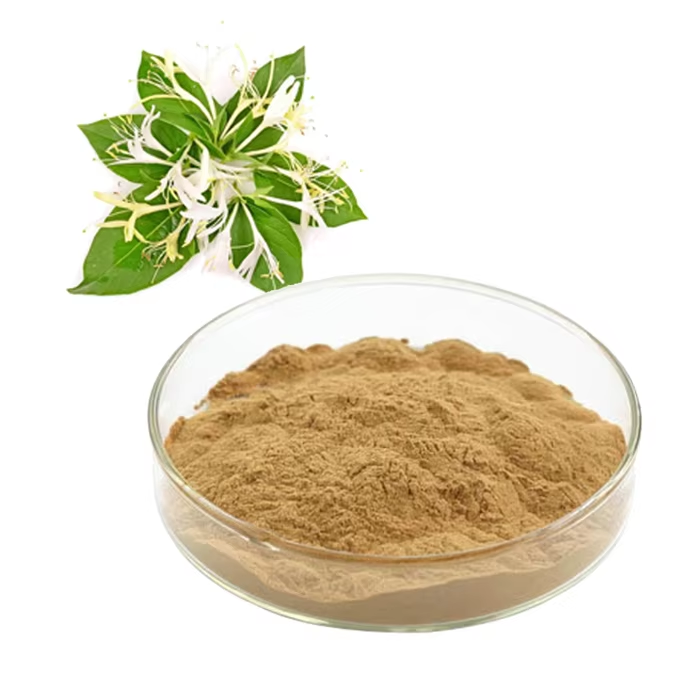Honeysuckle extract is derived from the flowers and leaves of the honeysuckle plant, and it has a variety of uses, particularly in traditional medicine and modern herbal remedies. Here are some common uses:
Anti-inflammatory Properties: Honeysuckle extract is often used for its anti-inflammatory effects, which can help alleviate symptoms of conditions like arthritis or other inflammatory diseases.
Antimicrobial Activity: It has been studied for its potential antimicrobial properties, making it useful in treating infections or as a natural preservative in some formulations.
Respiratory Health: In traditional medicine, honeysuckle is used to support respiratory health, helping to relieve symptoms of colds, flu, and other respiratory infections.
Skin Care: Honeysuckle extract is sometimes included in skincare products for its soothing and anti-inflammatory properties, which can help with conditions like acne or eczema.
Antioxidant Effects: The extract contains compounds that may have antioxidant properties, helping to protect cells from damage caused by free radicals.
Traditional Medicine: In traditional Chinese medicine, honeysuckle is used to clear heat and toxins from the body, often in the form of teas or tinctures.
Flavoring Agent: Honeysuckle extract can also be used as a natural flavoring agent in food and beverages.
As with any herbal remedy, it’s important to consult with a healthcare professional before using honeysuckle extract, especially if you have underlying health conditions or are taking other medications.
Who should not take honeysuckle?
Honeysuckle extract is generally considered safe for most people when used appropriately, but certain groups should use it with caution or avoid it altogether:
Pregnant and breastfeeding women: There is limited research on the safety of honeysuckle extract during pregnancy and breastfeeding, so it is best to avoid its use unless advised by a healthcare professional.
Allergic People: People who are allergic to honeysuckle or related plants may experience an allergic reaction and should avoid using this extract.
People with certain medical conditions: People with specific health problems, such as autoimmune diseases or those who are taking immunosuppressive treatments, should consult a healthcare provider before using honeysuckle, as it may affect immune function.
Taking Certain Medications: Honeysuckle may interact with certain medications, especially those that affect the liver or immune system. Consult your healthcare professional if you are taking medication, especially anticoagulants or immunosuppressants.
Children: The safety of honeysuckle extract in young children has not been well studied, so it is recommended to consult a pediatrician before giving it to children.
As always, it’s best to consult a healthcare professional before starting any new supplement or herbal remedy, especially if you have underlying health conditions or are taking other medications.
What are the side effects of honeysuckle?
Honeysuckle extract is generally considered safe for most people when used appropriately, but like any herbal remedy, it can have potential side effects. Some reported side effects include:
Allergic reaction: Some people may experience an allergic reaction, which may manifest as a rash, itching, or breathing problems.
Gastrointestinal Upset: In some cases, honeysuckle may cause stomach upset, nausea, or diarrhea, especially when taken in large amounts.
Interactions with drugs: Honeysuckle may interact with certain medications, especially those that affect the liver or immune system, causing unexpected side effects or reducing the effectiveness of the medication.
Dizziness or drowsiness: Some users may experience dizziness or drowsiness, especially when taking larger doses.
ALLERGY: In rare cases, an individual may experience an allergic reaction, symptoms of which may include swelling, difficulty breathing, or severe skin reactions.
As with any supplement or herbal remedy, it is important to use honeysuckle extract as directed and consult a healthcare professional if you experience any adverse reactions or have any concerns about its use, especially if you have underlying health conditions or are taking other medications.
Is honeysuckle a natural antibiotic?
Honeysuckle has been traditionally used across various cultures for its medicinal properties. Some research suggests it may have antimicrobial activity, leading it to be considered a natural antibiotic. Honeysuckle extracts contain compounds such as flavonoids and phenolic acids, which laboratory studies have shown to have antimicrobial and antiviral properties.
However, while honeysuckle may have some effectiveness against certain pathogens, it should not replace traditional antibiotics, especially for treating serious infections. Its use as an antibiotic should be approached with caution, and if an infection is suspected, always consult a healthcare professional for appropriate treatment options.
In summary, while honeysuckle may have some natural antibacterial properties, it should not be used as the primary treatment for infections.
Contact:Tony Zhao
Mobile:+86-15291846514
WhatsApp:+86-15291846514
E-mail:sales1@xarainbow.com
Post time: Oct-24-2025


